

Reglas para diferenciar: IN, ON y AT en inglés. Reglas para diferenciar: IN, ON y AT en inglés Las preposiciones de lugar en inglés : IN , ON y AT traen más de un quebradero de cabeza a los estudiantes de nivel intermedio, especialmente en el inglés escrito y hablado.
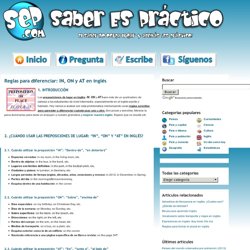
Hoy vamos a acabar con esta problemática memorizando unas reglas sencillas para aprender a diferenciar cuándo usar uno u otro . Son pocas y sencillas. Frases útiles para dar tu opinión en inglés. Frases útiles para dar tu opinión en inglés Hoy os traigo algunas frases útiles en inglés para enriquecer la habilidad argumentativa en el discurso hablado : dar la opinión de manera formal e informal y mostrar acuerdo o desacuerdo respecto a una opinión ajena (en diferentes niveles de formalidad).
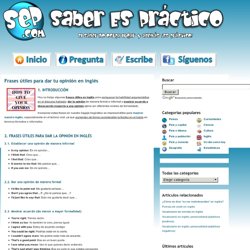
Incorporar estas frases en nuestro bagaje lingüístico es imprescindible para mejorar nuestro inglés , especialmente en el terreno oral, ya que aumentan de forma considerable la fluidez en el habla en terrenos formales e informales. 2.1. Verb Tense Practice Test. 1.
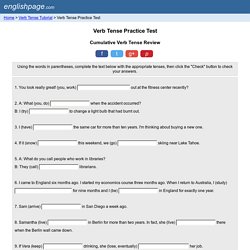
You look really great! (you, work) out at the fitness center recently? 2. A: What (you, do) when the accident occurred? The right tense. Verb + -ing or to. (1) Verb + -ing or to... (1) When one verb follows another verb, the structure is usually verb + -ing or verb + to...
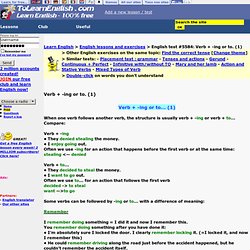
Compare: • They denied stealing the money. • I enjoy going out. Choose the tense. Grammar, Clauses, Adverbs, ESL, English. Inversions in English grammar ECPE exam questions. Focus on the University of Michigan ECPE exam In countries like Greece the Michigan ECPE has now become the most popular EFL/ESL test of proficiency in English.
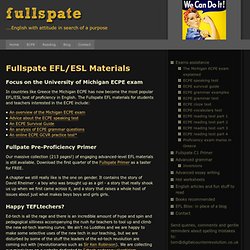
The Fullspate EFL materials for students and teachers interested in the ECPE include: Fullpate Pre-Proficiency Primer Our massive collection (213 pages!) Of engaging advanced-level EFL materials is still available. A chapter we still really like is the one on gender. Happy TEFLtechers? Ed-tech is all the rage and there is an incredible amount of hype and spin and pedagogical silliness accompanying the rush for teachers to tool up and climb the new ed-tech learning curve. One of the silliest of the digital revolutionaries is Professor Sugata Mitra. We should now change our agenda and figure out what the next big issues are in education. We should dematerialise our institutions, move education online, and in other talks he describes his Granny Cloud of unpaid mentors who can replace the teachers. By the Time: Indicating a future completion time. What picture do you have of the future?
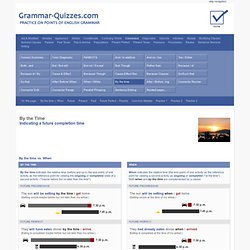
Will life in the future be better, worse or the same as now? Will this hot, flat, and crowded world be "standing room only"? People hope that by the year 2100, many of our current problems will have being solved. Clean water will be one of the most valuable resources. Demand for water will have been increased ten times. Energy will come from a variety of sources: wind, air, solar, hydrogen fuel, and nuclear fusion. The boundaries between entertainment and education will disappear. Air travel will be safer and faster. Alternate Conditional Forms - ESL. Most students learn the standard construction forms for the conditional forms in English.
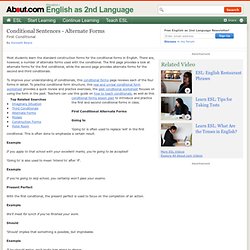
There are, however, a number of alternate forms used with the conditional. The first page provides a look at alternate forms for the first conditional, while the second page provides alternate forms for the second and third conditionals. To improve your understanding of conditionals, this conditional forms page reviews each of the four forms in detail. To practice conditional form structure, this real and unreal conditional form worksheet provides a quick review and practice exercises, the past conditional worksheet focuses on using the form in the past. Teachers can use this guide on how to teach conditionals, as well as this conditional forms lesson plan to introduce and practice the first and second conditional forms in class.
Mixed Conditionals. Present Results of a Past Condition If + Past Perfect + Would + Base Form in the main clause.
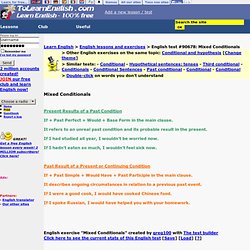
It refers to an unreal past condition and its probable result in the present. If I had studied all year, I wouldn't be worried now. If I hadn't eaten so much, I wouldn't feel sick now. Past Result of a Present or Continuing Condition. Past Perfect. The past perfect is a verb tense which is used to show that an action took place once or many times before another point in the past.
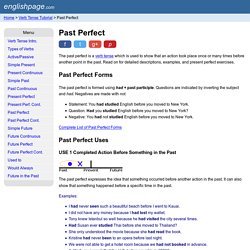
Read on for detailed descriptions, examples, and present perfect exercises. Past Perfect Forms The past perfect is formed using had + past participle. Questions are indicated by inverting the subject and had. Present Perfect. The present perfect is a verb tense which is used to show that an action has taken place once or many times before now.
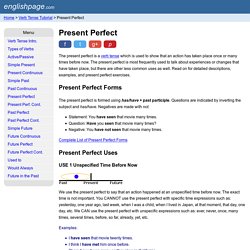
The present perfect is most frequently used to talk about experiences or changes that have taken place, but there are other less common uses as well. Read on for detailed descriptions, examples, and present perfect exercises. Future Perfect. As soon as I finish / I've finished. Future Simple - Lección de Inglés: Futuro simple- Hay dos formas principales para expresar el futuro. A veces son intercambiables, pero a menudo pueden tener significados diferentes. OM GRAMMAR-Gramática Inglesa Gratuita en Espanol. Esta estructura se utiliza para referirse a hechos o actividades futuras que ya han sido decididas o acordadas previamente. No conlleva ningún énfasis o intención particular, sino que se refiere simplemente a hechos o actividades que acontecerán con toda probabilidad. Advanced English Grammar Review 1 - Exam Preparation and Grammar Review.
While old-fashioned, I still find what I call "grammar banging" (intensive grammar review sheets) useful at the end or beginning of the year. The end of year calls for exam preparation and the beginning calls for some review to raise awareness of what has already been learnt and where problems still lie. The sheets provided in these "grammar banging" reviews are very effective because each question focuses on one important, specific area.